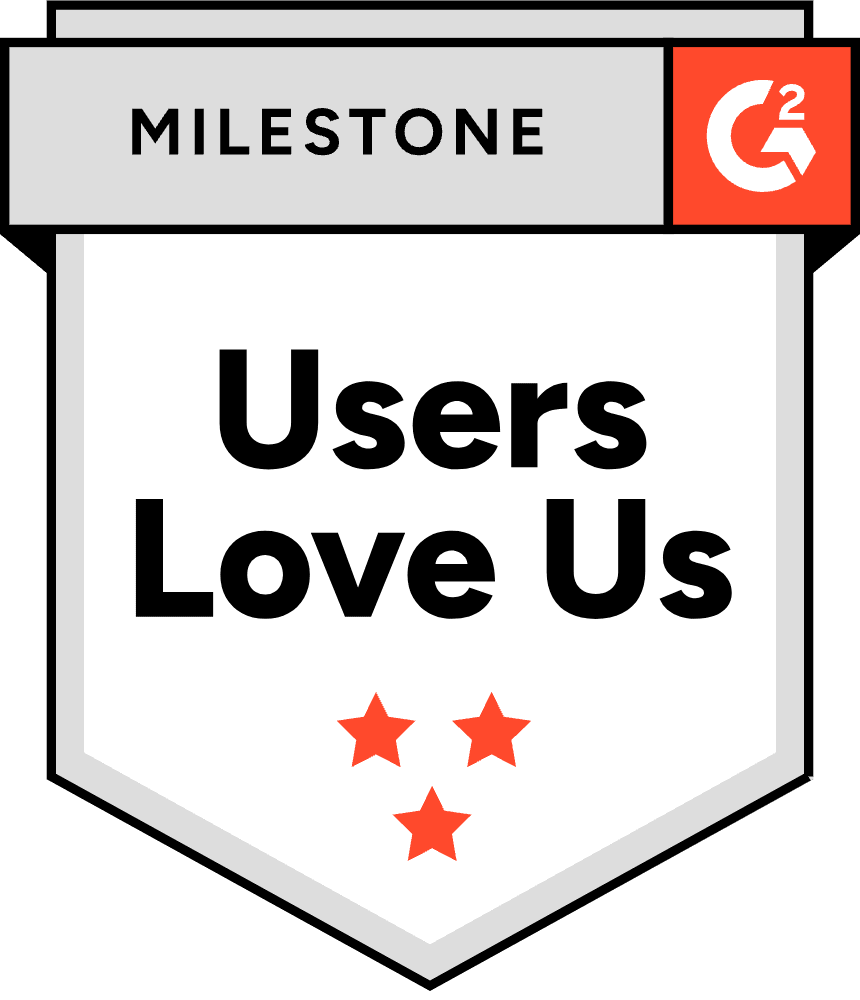Apollo vs ZoomInfo: Quick Comparison
| Feature | Apollo.io | ZoomInfo |
|---|---|---|
| Starting Price | $49/user/month (annual) | $14,995/year (Professional) |
| Database Size | 275M+ contacts | Extensive B2B database |
| Free Tier | Yes (limited credits) | No |
| Pricing Model | Transparent self-service | Custom quote-based |
| Best For | SMBs, cost-conscious teams | Enterprise, complex sales |
| Sales Engagement | Built-in (email, calls, sequences) | Limited (data-focused) |
| Intent Data | Basic | Advanced |
| CRM Integration | 50+ integrations | Deep native integrations |
Finding the right sales intelligence platform that meets your budget, requirements, and objectives can be challenging. This 2025 comparison guide analyzes two leading options, Apollo.io and ZoomInfo, to help you determine which solution may be best aligned with your needs. By outlining the core features, integrations, usability, data quality, pricing models, and pros and cons of each platform in a side-by-side format, you can better evaluate their respective strengths and limitations when it comes to enhancing prospecting, outreach campaigns, and go-to-market strategies powered by actionable data.
What is Apollo.io?
Apollo.io is an all-in-one B2B sales engagement platform that includes robust sales engagement tools to enhance and automate your prospecting and sales outreach efforts. It provides access to over 210 million contacts across 35 million companies, which you can filter and score to identify qualified leads. Apollo enables outreach across email and calls via its built-in dialer, and adds AI-assisted writing and research to improve message quality and speed.
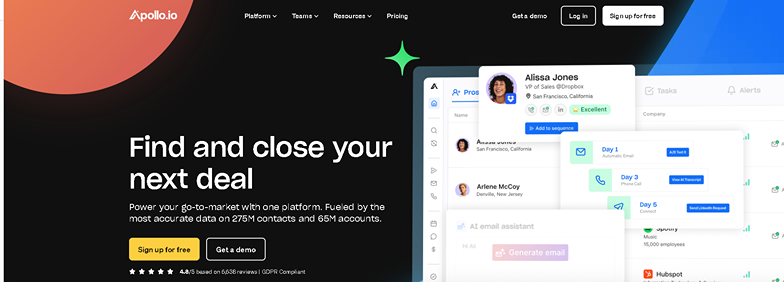
Throughout your sales interactions, Apollo captures signals to score leads and inform you of the next steps. It also syncs bi-directionally with your CRM to create a centralized workflow. With robust contact data, built-in workflows, and integration capabilities, Apollo aims to accelerate deals by aligning sales and marketing teams around the right contacts. It serves companies of any size looking to scale outbound processes.
What is ZoomInfo?
ZoomInfo is the leading business intelligence platform for sales, marketing, and recruiting teams. Its vast database empowers professionals to execute targeted go-to-market strategies. The platform provides comprehensive firmographic and technographic data, buying signals, and contact details to identify and connect with relevant prospects.
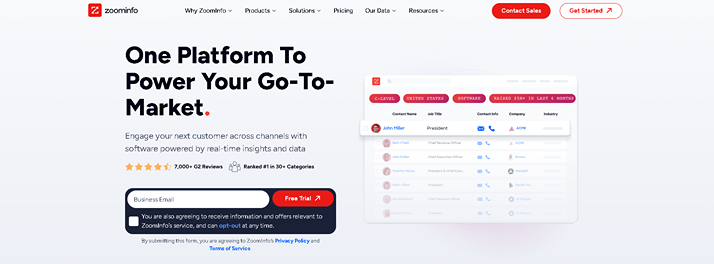
Users can generate quality leads, enrich customer data, create personalized outreach campaigns, and track engagement seamlessly within ZoomInfo or by integrating it with their existing stack, like CRM and inside sales software. Whether you need to accelerate sales cycles, boost lead conversion, expand market reach, or source top talent, ZoomInfo equips you with actionable data and insights to help achieve your growth objectives.
Apollo vs ZoomInfo Comparison Guide
While both platforms aim to fuel revenue growth through contact data and workflow automation, Apollo.io provides an affordable all-in-one platform for small teams. In contrast, ZoomInfo offers customized enterprise bundles powered by unmatched data depth and integration capabilities for large, complex organizations. This guide contrasts their features, data quality, integrations, usability, and pricing to help identify which solution best aligns to your business needs and budget.
Key Features
Apollo.io and ZoomInfo are leading sales intelligence platforms with complementary strengths. While both enrich contacts and automate workflows, Apollo provides end-to-end revenue capabilities powered by AI, whereas ZoomInfo focuses more narrowly on unrivaled contact data and CRM integration.
Apollo.io
Apollo.io’s main features include:
- Prospect & Enrich: Gives access to 275M+ contacts with 65+ advanced search filters and advanced search capabilities to identify qualified leads like ZoomInfo. However, Apollo provides more filters for precise targeting based on attributes like job changes and hierarchical relationships.
- Sales Engagement: Enables outreach across email lists, phone numbers, SMS, chatbots, and social media. Additionally, Apollo’s AI powers messaging and sequencing to increase connect rates.
- End-to-End Workflows: Automates repetitive sales tasks while leveraging AI for deal insights and revenue analytics. Though ZoomInfo has sales automation, Apollo takes a more comprehensive approach from prospecting to closing.
- Security & Compliance: Apollo states it is GDPR-compliant and certified for ISO 27001 and SOC 2. It enforces strong data protection and data privacy measures to support full data compliance and proper governance.
ZoomInfo
Whereas ZoomInfo’s core capabilities revolve around:
- Lead Builder and Filtering: Gives access to a comprehensive database and contact database featuring contact data entries, technographic data, decision-makers, org charts, and companies that you can segment with filters, all known for unparalleled data depth and accuracy.
- Integration: Seamlessly embeds ZoomInfo’s quality data and tools into CRM and marketing automation platforms, boosting efficiency.
- Data Enrichment: Automatically fills missing or outdated contact info in CRM to ensure accuracy.
- Intent Data and Alerts: Identifies high-intent buyers through search topics and sites visited to drive relevant outreach, broader intent coverage than Apollo.
Apollo is an end-to-end sales solution suitable for any revenue team. ZoomInfo offers robust data and automation to accelerate sales, suited for mid-market and enterprise.
Data Quality & Coverage
When it comes to the foundation of any sales and marketing platform, the quality and breadth of data is paramount. Apollo.io and ZoomInfo obtain robust contact and company research to fuel prospecting and outreach initiatives. However, they leverage different sources and verification processes that inform coverage and accuracy.
Apollo.io
Apollo.io gathers data from:
- Email Tools: Monitoring email list engagement and activity
- Public Sources: Crawling additional data points
- 3rd Party B2B Data Providers: Vetted for quality
This multi-sided approach, which includes crawling company websites, allows Apollo to deliver 275M+ contacts. The platform enriches records with demographic, firmographic, and intent signals. Apollo also refreshes data monthly and updates in real-time upon capturing buying signals.
ZoomInfo
Comparatively, ZoomInfo leverages:
- Contributory Network: Submission of first-party sales data
- Advanced Web Crawling: Proprietary techniques to gather intelligence
- While less transparent about sources, ZoomInfo provides extensive databases delivering comprehensive data coverage alongside firmographic and technographic details.
In summary, Apollo.io promotes transparency in its contributor-fueled data ecosystem, specificity around accuracy, and real-time refresh capabilities. ZoomInfo appears more opacity to safeguard its data science but suggests that its breadth of records, contact information, and intelligence is market-leading.
Integrations
In today’s intricate martech stacks, seamless integrations are pivotal for sales and marketing teams to interoperate systems efficiently. Apollo.io and ZoomInfo recognize this demand by embedding their data and tools as native integrations across multiple industry verticals to support diverse business growth. However, they take different approaches based on their specialties.
Apollo.io
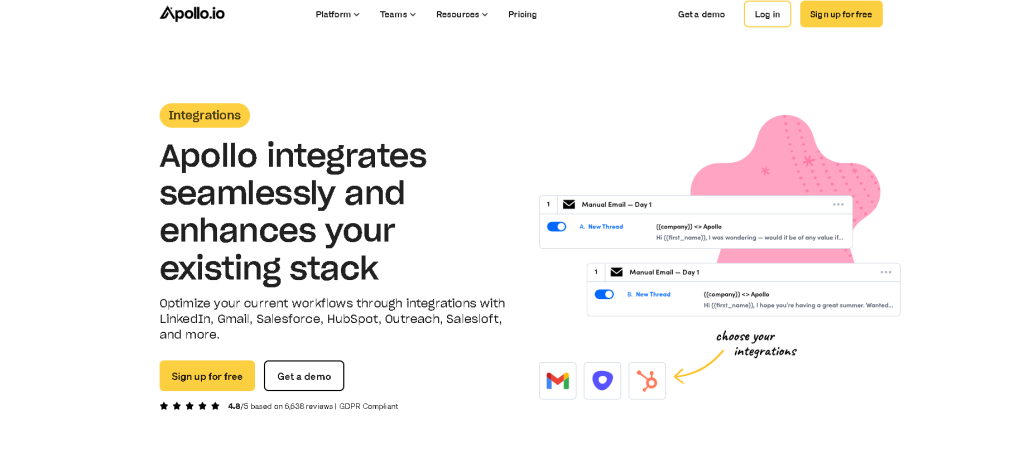
Apollo lists 50+ integrations, including Salesforce, HubSpot, Gmail, Outlook and more.
- Salesforce: Syncs Apollo’s contact database bi-directionally so reps can access annotated records directly within Salesforce for continuity.
- HubSpot: Automates the handoff of early-stage leads from Apollo into HubSpot CRM for nurture tracking.
- LinkedIn: Works alongside the Apollo Chrome extension for LinkedIn to speed up list-building.
- Gmail & Outlook: Embeds email tracking and logging natively into these clients to maintain visibility.
ZoomInfo
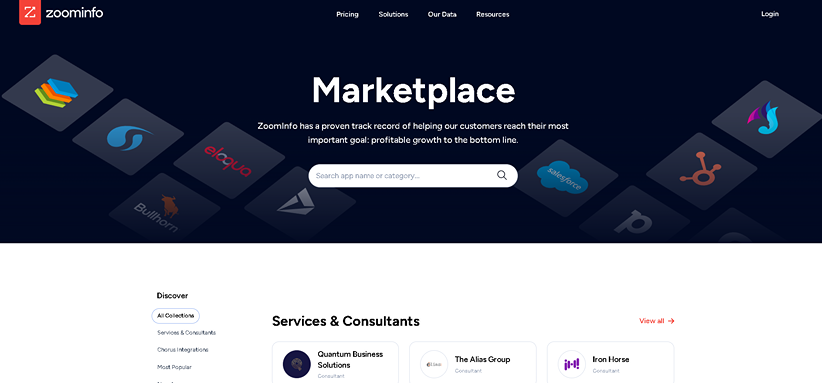
ZoomInfo integrates with Salesforce, Microsoft Dynamics 365, HubSpot, Marketo and other major go-to-market tools via its Marketplace.
- Salesforce: Enriches Salesforce data with ZoomInfo’s actionable firmographic and technographic insights.
- Microsoft Dynamics 365: Injects ZoomInfo intelligence directly into Dynamics for a 360-degree view of contacts.
- Marketo & HubSpot: Feeds actionable data into workflows to refine targeting and personalization
- Slack: Provides real-time alerts on buying signals and content consumption for rapid response.
In summary, Apollo.io links systems to streamline the execution of outbound sales processes end-to-end. This benefits customers seeking an integrated hub for orchestrating revenue operations seamlessly. Conversely, ZoomInfo permeates leading platforms with unmatched data to optimize targeting and engagement. It is ideal for enterprises with expansive stacks that ZoomInfo’s intelligence layer can amplify.
Usability
When adopting any new sales tool, usability is paramount for driving user adoption and ROI. Both Apollo.io and ZoomInfo aim to offer intuitive interfaces that allow users to navigate their robust capabilities with ease.
Apollo.io
A core strength of Apollo.io is its unified platform, consolidating functionalities from prospecting to closing. While this enhances continuity, it can lengthen the learning curve to leverage the end-to-end offerings compared to more focused tools. However, Apollo facilitates onboarding with built-in tips and training resources. Customization is flexible as well to tailor workflows. Apollo also handles extensive data sets smoothly for speed.
ZoomInfo
Similarly, ZoomInfo provides easy access to data through its simple search-driven interface to find targeted company intel quickly. Advanced features like buyer signals and recommendations take more upskilling, though. To accelerate mastery, ZoomInfo offers thorough onboarding guidance and 24/7 support. Users can also customize lead routing automation and data integration settings, among other options. With cutting-edge infrastructure, ZoomInfo delivers swift performance for data retrieval and alert triggers, which are capable of massive workloads.
Ultimately, Apollo.io trades focused speed for cross-function continuity, while ZoomInfo prioritizes intelligence accessibility, empowering data-driven decisions in the flow of work. Both platforms invest heavily in usability via customization, learning resources, and robust engineering.
Plans & Pricing
Apollo.io and ZoomInfo take divergent approaches to packaging and pricing their sales intelligence platforms. Apollo.io offers transparent self-service tiers for solopreneurs up to mid-market teams, enabling bottom-up adoption. At the same time, ZoomInfo employs customized enterprise bundles sold via field sales, catering to large consolidated buyers.
Apollo.io
Apollo.io embraces low-barrier adoption with a free forever tier allowing basic access, which is ideal for solopreneurs validating the tool and exploring subscription plans and pricing tiers in a transparent SaaS pricing model. Three paid self-service plans scale features and credits accommodating small to mid-market teams. Apollo’s pricing tiers provide incremental sales functionality from sequences to call recording. Larger enterprises can also request custom packages.
- Free: $0. Includes limited credits and basic features.
- Basic: $49 per user per month billed annually. Annual credit pool typically 30,000 credits for a 10-seat team.
- Professional: $79 per user per month billed annually. Annual credit pool typically 48,000 credits for a 10-seat team.
- Organization: Contact sales. Shown examples in the pricing file include multi-seat bundles. Treat this plan as quote-based.
New accounts often show a 14-day free trial with 50 trial credits.
ZoomInfo
Frustrated by ZoomInfo’s hidden pricing structure? You’re not alone. While ZoomInfo offers powerful B2B prospecting capabilities and an extensive contact database, their secretive pricing model makes budgeting and comparison nearly impossible.
This comprehensive breakdown covers ZoomInfo’s pricing plans, feature sets, and contract requirements—information they deliberately keep off their website. Whether you’re evaluating ZoomInfo for the first time or considering renewal options, we’ve done the research to help you determine if their platform justifies its premium cost.
From annual commitments starting at $14,995 to user licensing fees and credit-based systems, here’s everything you need to know before your sales call with their representatives.
- Professional Plan: $14,995 per year. Annual credit pool typically 5,000 credits for up to 3 users. Additional users cost $1,500 each, with discounts available for more than 20 users.
- Advanced Plan: $24,995 per year. Annual credit pool typically 10,000 credits plus 1,000 monthly user credits. User fees increase to $2,500, with similar discounts for larger user groups.
- Elite Plan: $39,995 per year. Annual credit pool typically 10,000 credits plus 1,000 monthly credits per user. User fees consistent with the Advanced plan. This plan offers the most in terms of features and add-ons.
Apollo.io favors expansion through product-led bottom-up growth, appealing to decentralized purchasing with transparent pricing. ZoomInfo instead concentrates on serving large consolidated buyers via field sales customization. So, Apollo.io’s self-service plans can enable testing before committing to budget. While ZoomInfo provides solutions realized through cost consulting.
ZoomInfo vs Apollo: Pros and Cons
Apollo.io and ZoomInfo have complementary strengths and weaknesses when it comes to sales intelligence capabilities and adoption factors like usability, support, and affordability.
ZoomInfo Pros and Cons
ZoomInfo stands out for its extensive database, seamless CRM integrations, and predictive insights but faces cost and learning curve barriers.
Pros:
- Vast database
- High-quality, accurate data for effective outreach
- User-friendly interface and usability
- Robust integrations
- Buyer signals and recommendations and actionable insights
Cons:
- Expensive pricing that may limit adoption
- Some gaps in contact data completeness
- The steep learning curve for advanced features
Apollo.io Pros and Cons
Apollo.io shines for its transparent pricing, intuitive interface, and all-in-one platform but has faced some data coverage and security concerns.
Pros:
- Very affordable and transparent pricing
- Accuracy of contact data praised by users
- Simple and intuitive interface for usability
- Generous free tier to get started, plus a 14-day trial with 50 trial credits for new accounts.
- All-in-one platform approach
Cons:
- Limitations in data coverage, especially in smaller firms
- Periodic latency issues during peak usage
- Some concerns noted around data security practices
- Support responsiveness has faced criticism
ZoomInfo wins for data breadth and quality, while Apollo.io’s leading edge is low-cost accessibility. Both aim to enable sales and marketing but may face gaps in certain data elements. Ultimately, the ideal choice depends on budget, use case complexity and price prioritization versus intelligence depth.
Apollo vs ZoomInfo: The Bottom Line
Apollo.io and ZoomInfo address distinct needs in the sales intelligence market. Apollo.io offers an affordable, all-in-one revenue growth platform for small and midsize teams, while ZoomInfo provides premium, customized data and insights for large enterprises with complex sales processes to optimize
Choose Apollo.io If You’re Seeking Affordability and an All-in-One Platform
Choose Apollo.io if you want an affordable, unified sales platform suitable for early-stage growth and small to midsize teams. Its combination of accurate data, lead engagement tools, and workflow automation in a single intuitive interface can accelerate revenue operations for budget-conscious businesses. While more limited in depth than ZoomInfo, Apollo.io’s transparency and generous free tier facilitate accessible adoption.
Choose ZoomInfo If You Require Extensive Data and Advanced Features
Conversely, choose ZoomInfo if you require enterprise-grade data breadth, advanced segmentation, and real-time insights to inform sales, marketing, and recruiting strategies. Albeit at a premium cost, ZoomInfo’s unmatched intelligence empowers nuanced targeting and outreach. With predictive recommendations and robust CRM integrations, ZoomInfo brings propensity modeling and workflow efficiency to revenue teams within complex organizations.
In short, Apollo.io streamlines outbound selling for high-velocity small businesses, while ZoomInfo fuels insight-driven decisions for large enterprises. Evaluate your budget, headcount, use cases, and data needs to determine the best fit. However, both platforms aim to enhance go-to-market execution.
Neither Tool a Good Fit? UpLead is the All-in-One Alternative
If Apollo and ZoomInfo fall short or prove cost-prohibitive, UpLead will emerge as the all-in-one competitor, combining robust data and an intuitive interface at a reasonable price. UpLead shines for:
- Transparent pricing and buying options benefiting SMBs
- Verified data quality via automation and human oversight
- Simple and straightforward UI accelerating user adoption
- 50+ advanced filters enabling targeted lead segmentation
- Free trial to experience value firsthand, risk-free
By blending accurate, actionable intelligence with sales workflow features into an accessible platform, UpLead allows pre- and post-revenue teams to execute effective growth strategies that are aligned with their budget. Sign up for a complimentary trial.
FAQs About Apollo vs ZoomInfo
When deciding between Apollo.io and ZoomInfo, it’s essential to consider various factors such as data quality, coverage, usability, and pricing. Here’s a brief overview to help you make an informed decision.
Apollo beats ZoomInfo in affordability, while ZoomInfo wins in data breadth. So Apollo suits cost-conscious teams, while ZoomInfo powers larger enterprises.
Potential reasons to avoid ZoomInfo are high pricing, some data inaccuracies, and overkill for early-stage needs.
Apollo provides substantial value with sales automation, accurate data, and robust features at a reasonable price point for many growing businesses, making it a worthwhile investment.
Apollo.io and ZoomInfo both offer strong lead and sales intelligence capabilities. ZoomInfo is known for its extensive data and enterprise-focused features, while Apollo.io is popular for its ease of use, built-in outreach tools, and cost-effectiveness.
Apollo.io offers email automation to make it easier to run and manage outreach campaigns. Plans include annual credit pools that scale by tier.
For high-performing sales and marketing teams, data accuracy, database coverage, and relevant data are critical to driving precise lead generation, optimizing lead generation efforts, and ensuring efficient, scalable sales operations. Without reliable data, teams risk targeting the wrong accounts, wasting resources, and missing revenue opportunities.
Apollo vs ZoomInfo pricing differs in that Apollo uses transparent self-service subscription plans with clear pricing tiers and a free forever tier, while ZoomInfo applies customized enterprise bundles requiring consultation, which affects return on investment and cost predictability.
The main differences between Apollo.io and ZoomInfo lie in pricing and data depth. Apollo.io offers transparent subscription plans with built-in sales engagement tools and workflow automation, while ZoomInfo provides a more extensive contact database along with advanced firmographic and technographic data through customized pricing tiers.
When comparing ZoomInfo and Apollo.io, consider your priorities such as subscription plans versus customized bundles, lead and sales intelligence, data accuracy, native integrations, and return on investment. These factors will help you choose the right data provider for your needs.
When evaluating UpLead vs ZoomInfo, consider factors such as pricing tiers, free trial options, data accuracy, EMEA contact data coverage, and usability to decide which service fits smaller businesses or enterprise requirements best.
Both platforms are committed to overall data compliance, including GDPR and CCPA, ensuring strong data protection and user data privacy. The key difference is in their strategy: ZoomInfo emphasizes its robust governance and proactively notifies individuals that their data is in its platform, while Apollo focuses on transparency about its data-sourcing processes. With either service, the user shares the responsibility for using the data in a compliant manner.
What You Need to Remember About ZoomInfo vs Apollo
Both Apollo.io and ZoomInfo offer robust capabilities to accelerate revenue growth but suit different use cases. Apollo equips high-velocity SMBs with an end-to-end sales platform optimizing outbound processes at an affordable price point. Meanwhile, ZoomInfo powers complex organizations with unmatched data breadth and predictive insights to inform strategy-led selling motions.
Apollo checks the boxes for cost-conscious scaling teams, while data-driven enterprises need ZoomInfo’s intelligence layer. If neither fits, explore UpLead as the data provider to source contact data alternatives, blending top capabilities at reasonable pricing.






